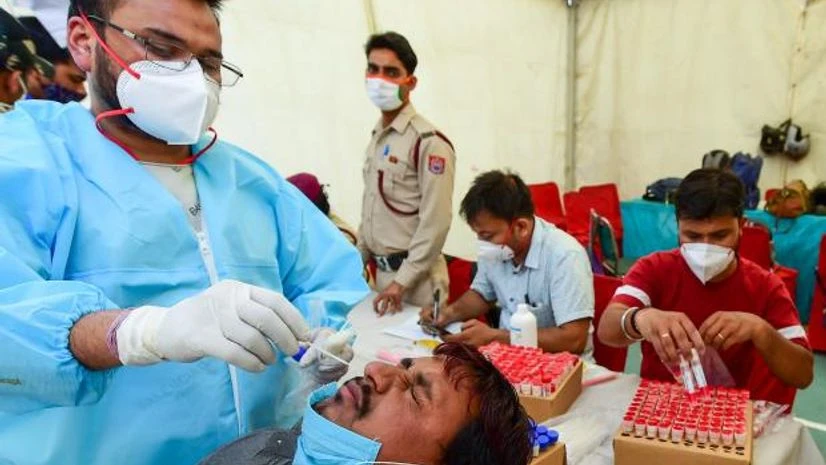Maharashtra and Punjab are the two worst hit states in terms of their share in the total number of new cases and fatalities across the country in the last fortnight, according to official documents.
The two states also top the charts among states or UTs that have crossed their ever-reported peaks for new cases and are followed by Chandigarh, Chhattisgarh and Gujarat in the top-five, shows a presentation made by the Union Health Ministry during the last review meeting held by the Cabinet Secretary with all states and union territories.
The growth rate of last seven days for daily new cases till March 23 in Maharashtra was 3.6 per cent and in Punjab it was 3.2 per cent.
Maharashtra has added 4,26,108 cases in last two weeks as on March 31, while Punjab has added 35,754 cases in the same period.
Of all deaths which happened during the two weeks period ending March 31, Maharashtra and Punjab together reported around 60 per cent of India's fatalities.
Also Read
According to the health ministry, 11 states -- Maharashtra, Punjab, Karnataka, Kerala, Chhattisgarh, Chandigarh, Gujarat, Madhya Pradesh, Tamil Nadu, Delhi and Haryana have been categorised as "states of grave concern"on account of their high and rising daily case and higher daily deaths
They have contributed 90 per cent of COVID cases, 90.5 per cent of deaths in 14 days till March 31, and have crossed or close to crossing their early reported peaks last year, it said.
After detailed and comprehensive review of measures taken by states and UTs, the Cabinet Secretary on April 2 reiterated the necessity of meticulous and hard work regarding stringent enforcement of containment and surveillance measures, in conjunction with ramping up vaccination and strict enforcement of COVID appropriate behaviour.
The states were specifically asked to increase testing continuously to ensure that positivity comes down to 5 per cent or less than that, focuson ensuring RT-PCR tests comprise 70 per cent of total tests, reducewaiting time of test results with regular review with testing labs,useRapid Antigen Tests (RAT) as screeningtestin densely populated areas and where fresh clusters are emerging and ensure that allsymptomatic RAT negatives are mandatorily subjected to RT-PCR tests.
They were also asked to ensureeffective and prompt isolation of those infected in institutional facilities (COVID Care Centres) and that patients isolated at home are to be monitored daily.
Isolated infected persons should be transferred immediately to health facilities, if required.
They were asked to ensure that 25 to 30 such close contacts aretraced for each infected person.
"Tracing of close contacts and their isolation to be done in 72 hours. Subsequent testing and follow up of all close contacts to be carried out.Setting up of Containment Zones/ Micro Containment Zones to break the chain of transmission" was also stressed.
States were also asked to examine Case Fatality Rate hospital-wise, devise appropriate strategy and mitigate concerns regarding late admission in hospitals and non-adherence to National Clinical Management Protocol.
In order to minimize daily fatalities, the states were advised on strengthening of public and private healthcare resources.
They were specifically asked to increase the number of isolation beds, oxygen beds, ventilators/ICU beds as per requirement, plan for adequate oxygen supply, strengthen ambulance service and reduce response time and refusal rate with regular monitoring by local administration and ensure adequate number of contractual staff and optimum rostering of duties.
Use of Police Act, Disaster Management Act and other legal/administrative provisions for imposing penalties on defaulterswas underscored for immediate compliance by states and UTs.
Besides, use of local officials, political, cultural, sports, religious influencers to disseminate information proper wearing of masks and maintaining physical distance was also stressed.
They were asked to focus on markets, fair/melas, social and religiouscongregationthat could become super spreader events while enhancing awarenessthat COVID appropriate behaviour is equally important as vaccination, and this needs to be followed even after vaccination.
In order to saturate vaccination for priority age groups in districting reporting surge in daily COVID cases, the states and UTs were advised to maketime-bound plan of 100 per cent vaccination of eligible peopleandcoordinatewith the Union Health Ministry to ensure adequate vaccine doses.
(Only the headline and picture of this report may have been reworked by the Business Standard staff; the rest of the content is auto-generated from a syndicated feed.)

)
